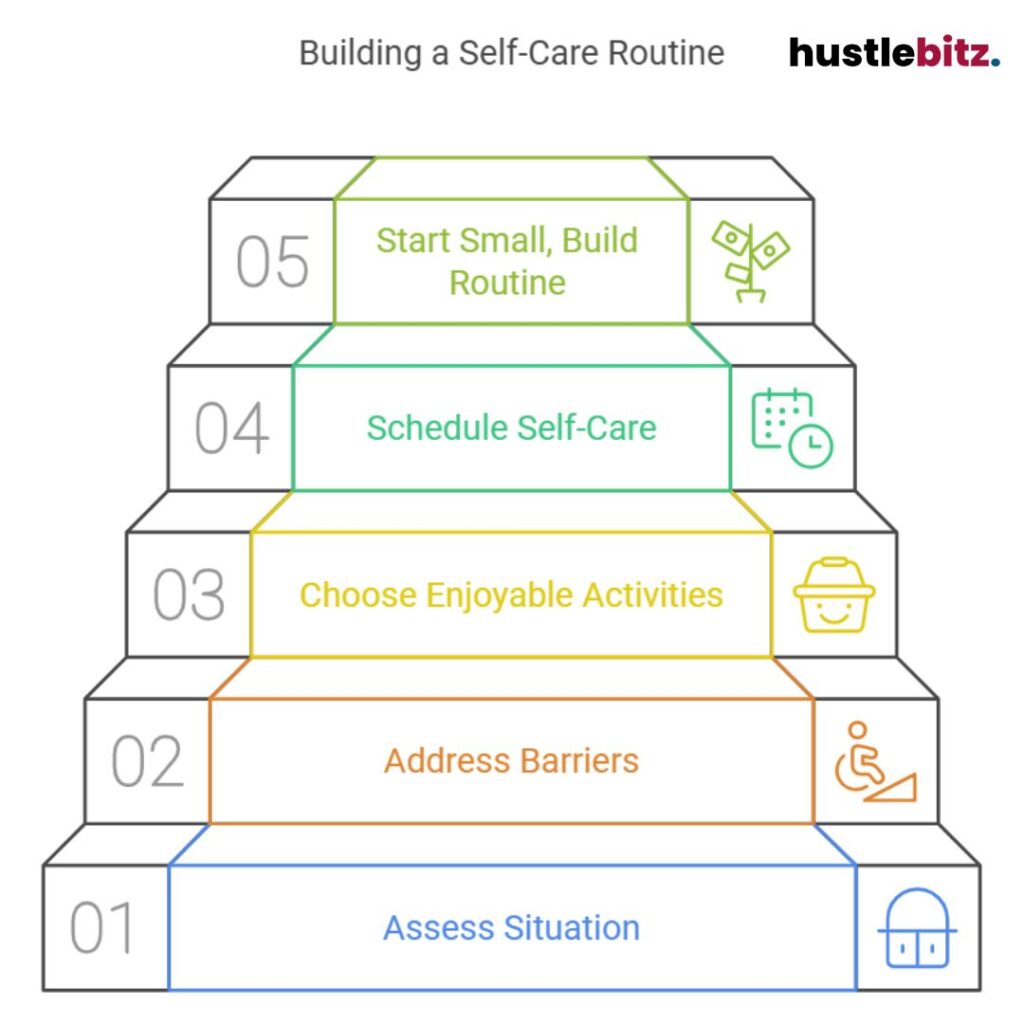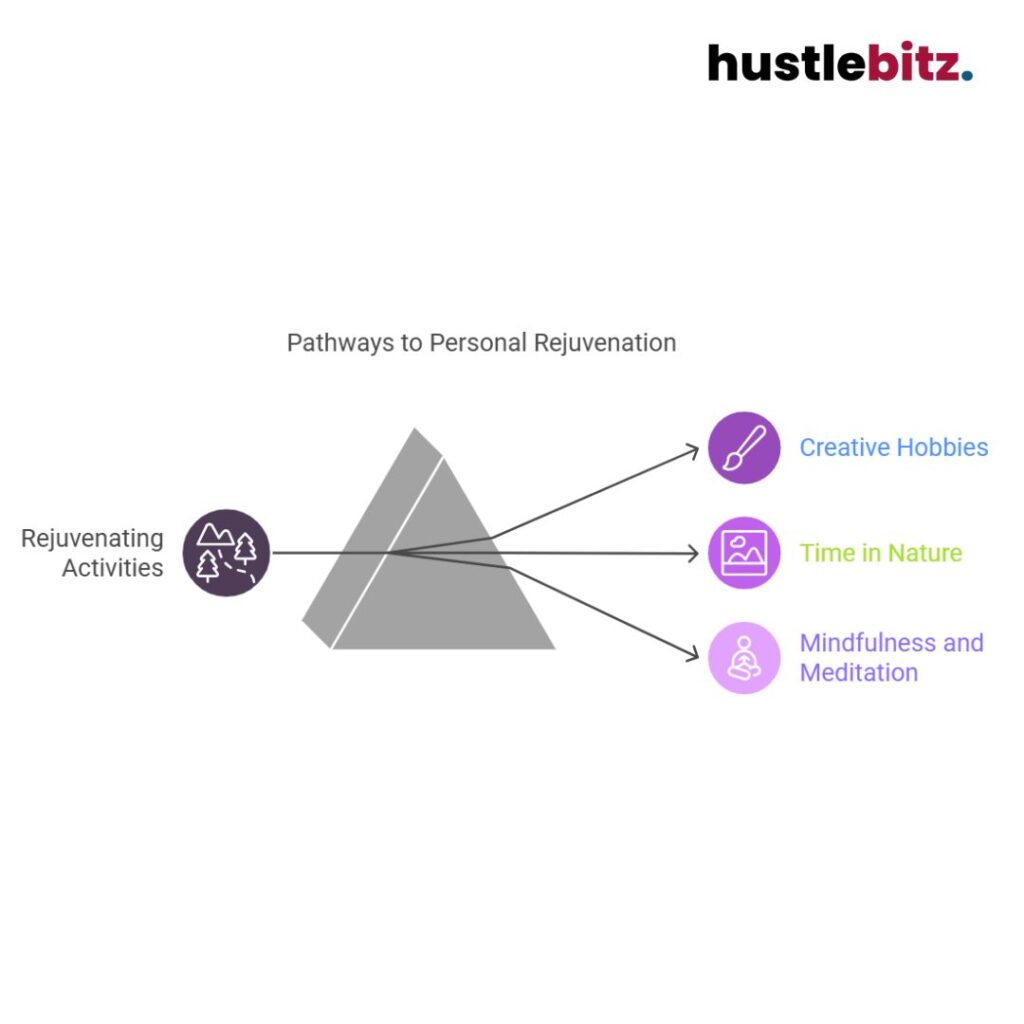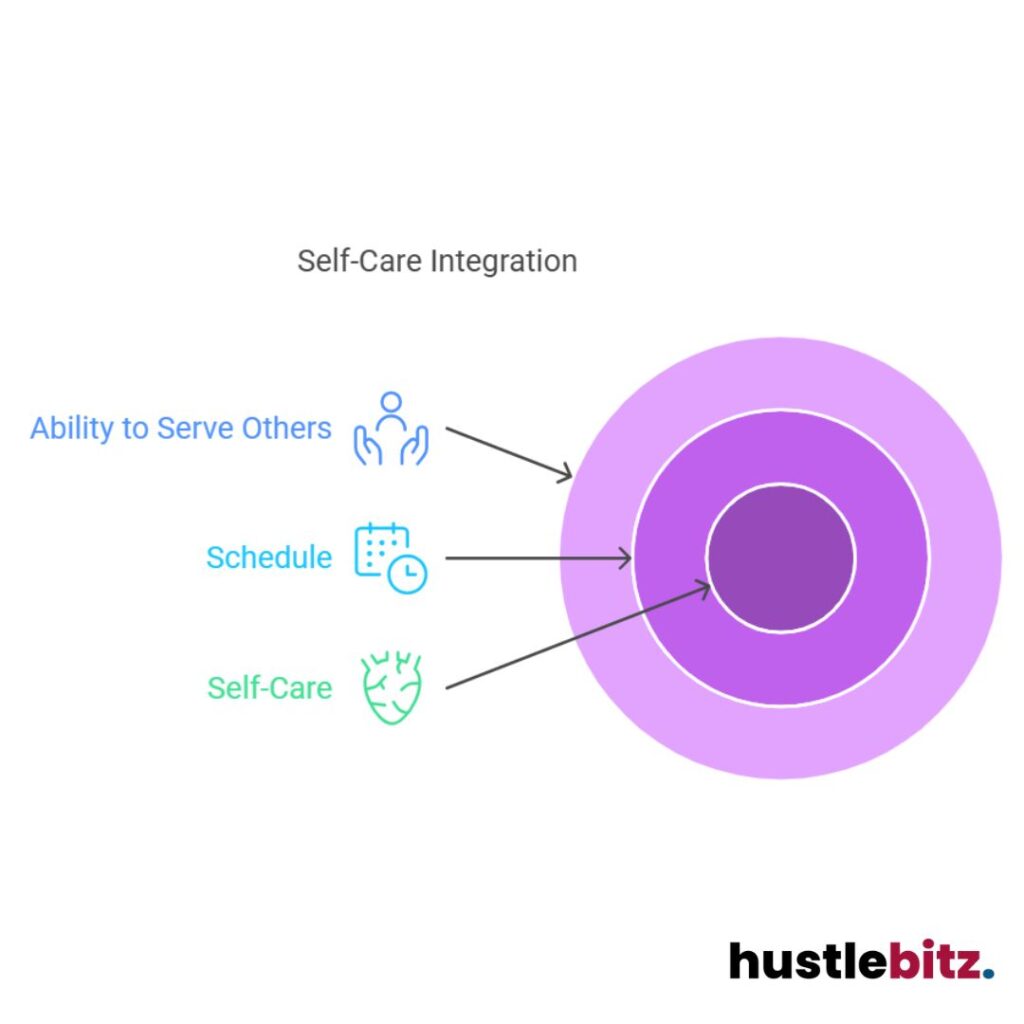Creating a self-care routine involves a tailored approach that considers your unique needs. Start by understanding what aspects of well-being require attention—physical, emotional, or social. Identify barriers, such as time constraints or guilt, that hinder your self-care. Select enjoyable activities to ensure engagement. Establish a dedicated schedule treating self-care as a priority, and begin with small, manageable practices to cultivate lasting habits. Incorporate mindfulness to enhance mental clarity and presence. This structured method fosters not only personal well-being but also productivity in other areas of life, inviting further exploration of optimizing your self-care journey.
Key Takeaways
- Assess your current situation to identify specific self-care activities that cater to your physical, emotional, and mental well-being.
- Recognize and address barriers such as time constraints and emotional guilt to prioritize your self-care needs effectively.
- Choose enjoyable activities that bring joy and refreshment, ensuring regular engagement to enhance overall well-being.
- Create a structured schedule with dedicated time slots for self-care, treating them as non-negotiable commitments.
- Start with small, manageable self-care practices and gradually build up to a comprehensive routine for lasting change.

Understand Your Self-Care Needs

Understanding your self-care needs is essential for developing a personalized routine that effectively supports your physical, emotional, and mental well-being. As individuals who often prioritize the needs of others, it is vital to recognize that your own self-care is not merely an indulgence but a necessary component for maintaining the capacity to serve effectively.
To create a meaningful self-care routine, start by assessing your current situation and identifying specific self-care activities that resonate with you. Consider the various dimensions of well-being—physical, emotional, social, and spiritual—and how each affects your overall mental health and well-being. This comprehensive understanding will enable you to prioritize activities that align with your personal values and needs.
Reflect on what rejuvenates you: whether it’s engaging in a creative hobby, spending time in nature, or practicing mindfulness and meditation. Once you have identified these activities, integrate them into your daily or weekly schedule, ensuring that they are not treated as optional but rather as essential commitments.

Identify Barriers to Self-Care
Recognizing the barriers to self-care is crucial for creating a sustainable routine that effectively supports your well-being. Many individuals who are committed to serving others often neglect their own needs, leading to burnout and diminished capacity to provide care. To enhance your ability to prioritize self-care, it is essential to identify barriers that may impede your efforts.
Common obstacles include time constraints, overwhelming responsibilities, and a lack of awareness about the importance of self-care. For those who are accustomed to putting others first, it can be challenging to shift focus onto personal needs. Additionally, feelings of guilt or inadequacy may arise when attempting to carve out time for self-care. These emotional barriers can be significant impediments to establishing healthy self-care strategies.
To effectively manage stress and maintain your well-being, consider implementing simple steps to address these barriers. Start by conducting an honest self-assessment of your daily schedule and responsibilities. Identify pockets of time that can be dedicated to self-care without sacrificing your obligations to others. Setting boundaries and communicating your needs can also empower you to protect your self-care time.
Choose Activities You Enjoy

Selecting activities that bring you joy is a fundamental aspect of crafting an effective self-care routine. When you prioritize self-care, it is essential to recognize that the activities you choose play a vital role in rejuvenating your spirit and enhancing your ability to serve others. Engaging in enjoyable pursuits not only fosters personal well-being but also equips you to be more present and attentive in your relationships and commitments.
To begin, reflect on the activities that spark joy and fulfillment in your life. This could range from creative endeavors such as painting or writing, to physical activities like hiking or dancing. Self-care ideas can also include simple pleasures like reading a book, gardening, or spending time with loved ones. The key is to choose activities you enjoy, as they will naturally energize and inspire you.
Moreover, consider the frequency and duration of these activities when designing your self-care routine. It is important to strike a balance that allows for regular engagement with your favorite pastimes while accommodating your responsibilities. Remember, prioritizing self-care is not an indulgence; it is a necessity that enables you to nurture your well-being.
Ultimately, by intentionally selecting activities that resonate with you, you can create a routine that not only supports your mental and emotional health but also empowers you to serve others with greater compassion and dedication. Embrace the joy of self-care and watch how it transforms your interactions and overall life satisfaction.
Create a Schedule

Establishing a well-structured schedule is essential for effectively integrating self-care activities into your daily life. A thoughtfully crafted schedule allows you to create a self-care routine that not only nurtures your well-being but also enhances your ability to serve others. When you prioritize self-care, you replenish your energy and emotional resources, which ultimately benefits those around you.

To create a self-care routine that resonates with your unique needs, begin by identifying the activities that invigorate and relax you. Once you have a list, consider how to incorporate self-care into your daily schedule. Start by setting aside specific time slots dedicated solely to these activities, whether it’s a morning meditation, an afternoon walk, or an evening reading session. The key is consistency; treating these time slots as non-negotiable appointments can help you maintain your commitment.
Next, evaluate your current obligations and determine where you can make adjustments. Perhaps you can delegate certain tasks or streamline your responsibilities to create more space for personalized self-care. Remember, the steps you can take towards a balanced schedule may require some trial and error, so be flexible and open to change.
Start Small and Build Up

Starting with small, manageable self-care activities can pave the way for more significant, lasting changes in your routine. For those who serve others, it’s essential to remember that making self-care a priority is not merely a luxury; it is a necessity that enables you to be more effective in your role. By starting small, you can successfully integrate different types of self-care into your daily routine without feeling overwhelmed.
Consider implementing a few simple activities that can gradually evolve into a more comprehensive self-care routine. The following table presents some initial self-care ideas that can be incorporated into your day-to-day life:
| Self-Care Activity | Frequency |
| Take a 5-minute mindful break | Daily |
| Drink a glass of water | Daily |
| Journal thoughts or feelings | 2-3 times a week |
| Enjoy a short walk outside | 2-3 times a week |
| Engage in a hobby | Weekly |
Incorporate Mindfulness Practices
Integrating mindfulness practices into your self-care routine can significantly enhance your overall well-being and mental clarity. Mindfulness, defined as the practice of being fully present and engaged in the moment, can profoundly impact one’s mental well-being. By incorporating mindfulness techniques, you not only foster a deeper connection with yourself but also equip yourself to serve others more effectively.
To begin, consider setting aside a few minutes each day for mindfulness exercises. This could involve meditation, deep breathing, or even mindful walking. Each practice encourages awareness of your thoughts and feelings without judgment, allowing you to cultivate a sense of peace. As you become more attuned to your inner self, you may find it easier to manage stress and anxiety, leading to improved overall health.
Incorporating mindfulness into your self-care routine can also extend to your daily activities. Engaging in tasks such as eating or cleaning with intention can transform mundane moments into opportunities for mindfulness. This practice allows you to appreciate the present and can enhance your interactions with others, fostering a compassionate approach to service.
Final Thoughts
Creating a self-care routine is an essential step toward maintaining overall well-being, and it requires intentionality and consistency. By understanding your unique needs, identifying and overcoming barriers, choosing activities that bring joy, and incorporating mindfulness, you can establish a routine that nurtures both your physical and emotional health. Start small and gradually build up your practices, ensuring they become an integral part of your daily life. Remember, self-care is not a luxury but a necessity that empowers you to serve others more effectively while maintaining your own balance and fulfillment. Embrace this journey, and watch how it positively transforms every aspect of your life.




